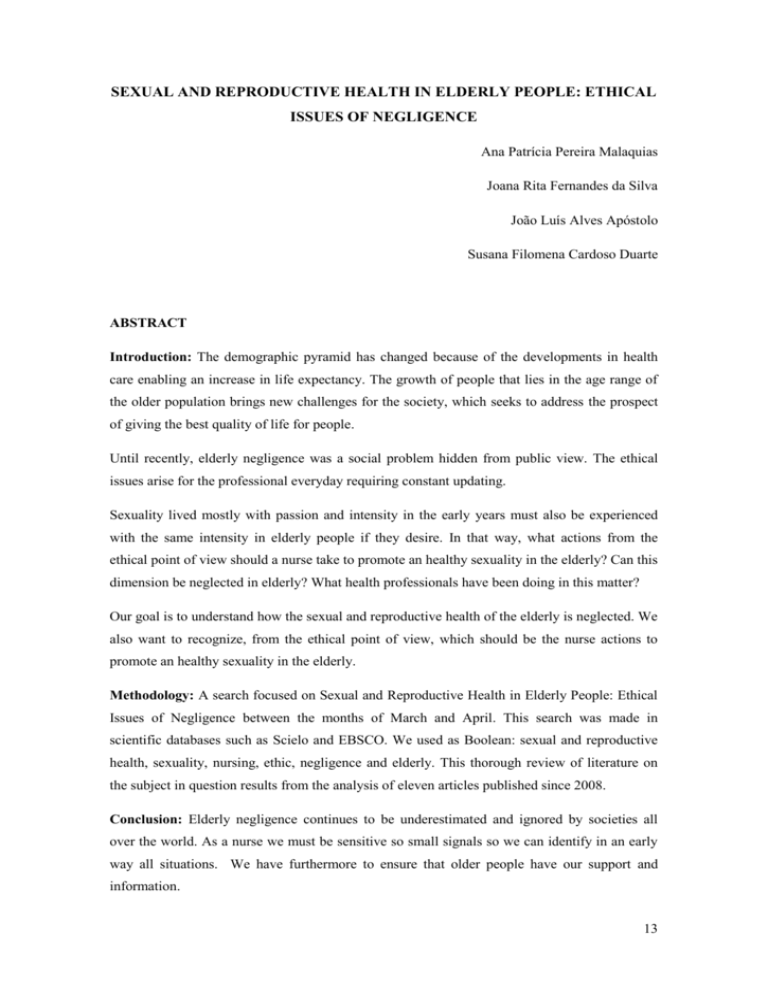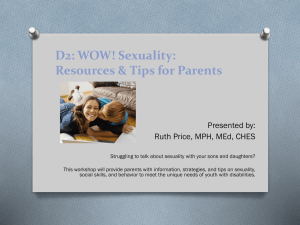
SEXUAL AND REPRODUCTIVE HEALTH IN ELDERLY PEOPLE: ETHICAL
ISSUES OF NEGLIGENCE
Ana Patrícia Pereira Malaquias
Joana Rita Fernandes da Silva
João Luís Alves Apóstolo
Susana Filomena Cardoso Duarte
ABSTRACT
Introduction: The demographic pyramid has changed because of the developments in health
care enabling an increase in life expectancy. The growth of people that lies in the age range of
the older population brings new challenges for the society, which seeks to address the prospect
of giving the best quality of life for people.
Until recently, elderly negligence was a social problem hidden from public view. The ethical
issues arise for the professional everyday requiring constant updating.
Sexuality lived mostly with passion and intensity in the early years must also be experienced
with the same intensity in elderly people if they desire. In that way, what actions from the
ethical point of view should a nurse take to promote an healthy sexuality in the elderly? Can this
dimension be neglected in elderly? What health professionals have been doing in this matter?
Our goal is to understand how the sexual and reproductive health of the elderly is neglected. We
also want to recognize, from the ethical point of view, which should be the nurse actions to
promote an healthy sexuality in the elderly.
Methodology: A search focused on Sexual and Reproductive Health in Elderly People: Ethical
Issues of Negligence between the months of March and April. This search was made in
scientific databases such as Scielo and EBSCO. We used as Boolean: sexual and reproductive
health, sexuality, nursing, ethic, negligence and elderly. This thorough review of literature on
the subject in question results from the analysis of eleven articles published since 2008.
Conclusion: Elderly negligence continues to be underestimated and ignored by societies all
over the world. As a nurse we must be sensitive so small signals so we can identify in an early
way all situations. We have furthermore to ensure that older people have our support and
information.
13
Nurses have a predominant action, promoting sexuality of the elderly. The respect for the
privacy of the person should be guaranteed. We also must be available to help or withdraw
doubts, ensuring that sexuality is lived in its fullness.
Key-words: Sexual and reproductive health, sexuality, elderly, negligence and ethical issues.
INTRODUCTION
The analysis from the ethic point of view of negligence in sexual and reproductive health of the
elderly brings us to the knowledge of a set of concepts: sexual health, sexuality, negligence and
ethics.
“Sexual health is a state of physical, emotional, mental, and social well-being in relation to
sexuality” (Collumbien et al., 2012, p. 6). That kind of health entails a positive and respectful
approach to sexuality and sexual relationships, “…as well as the possibility of having
pleasurable and safe sexual experiences, free of coercion, discrimination and violence” (idem).
Developing during the entire life cycle, sexuality is part of human identity, and is an internal
factor that motivates the search and experience of pleasure (Moraes and Vitalle, 2012, p.49). So
“sexuality is a central aspect of being human throughout life (…) is experienced and expressed
in thoughts, fantasies, desires, beliefs, attitudes, values, behavior, practices, roles and
relationships” (Collumbien et al., 2012, p. 6).
People not always experience or express these dimensions (idem). Moreover sexuality can be
“…influenced by the interaction of biological, psychological, social, economic, political,
cultural, legal, historical, religious and spiritual factors” (idem).
With ageing, the elderly believe they are asexual beings, neglecting the care of their sexual and
reproductive health. According to WHO (2008, p.1) “negligence is culturally defined as a
phenomenon that reflects distinctions between values, norms and unacceptable interpersonal
behaviors”. To devalue their sexual health, the elderly are losing quality of life.
The field of health care raises numerous ethical concerns. “Ethics provide a framework for
evaluating problems and determining an appropriate course of action” (WHO, 2009, p.19).
In that way, what actions from the ethical point of view should a nurse take to promote an
healthy sexuality in the elderly? Can this dimension be neglected in elderly? What health
professionals have been doing in this matter?
METHODOLOGY
13
A search focused on Sexual and Reproductive Health in Elderly People: Ethical Issues of
Negligence between the months of March and April. This search was made in scientific
databases such as Scielo and EBSCO. We used as Boolean: sexual and reproductive health,
sexuality, nursing, ethic, negligence and elderly. This thorough review of literature on the
subject in question results from the analysis of five articles published since 2008.
RESULTS
Elder neglect is a main public health problem. According to Bonnie and Wallace apud Halphen
Varas and Sadowsky (2009, p. 13) “…between 1 and 2 million Americans aged 65 or older
have been hurt, exploited, or mistreated by someone they depend on for care.”.
“Elder abuse has serious consequences for the health and well-being of older people and can be
of various forms (…). It can also simply reflect intentional or unintentional neglect.” (WHO,
2008, p. 6). As a nurse we should identify in an earlier way and report this kind of cases and our
intervention is ethically and legally required. Without intervention, elderly morbidity and
mortality increases (Halphen, Varas and Sadowsky, 2009, p. 16).
Actually most of the cases are not identified and reported (idem). “There barriers mainly result
from a lack of clinician education and comfort regarding this topic” (idem). The health
professionals need to understand the phenomenon of elder mistreatment, screen and identify the
cases (idem). The “…awareness of risk factors and warning signs, and awareness of appropriate
interventions will help to eliminate these barriers and result in clinicians properly fulfilling their
duty to help protect their most vulnerable elderly patients” (idem).
Elderly people experience some emotional changes, but sentiments and sensations are not
degenerated with aging (Baldissera e Bueno, 2010, p. 623). Sexuality is something that
accompanies us throughout life from the moment we are born until we die. Elderly have some
difficult in living their sexuality mainly because they got the perception that they are asexual
(idem). This way of thinking about sexuality in older people is the way society thinks that
influences the elderly sexual health. This fact affects their experiences much more than any
physical or pathological limitation (idem).
Sexual health should be addressed in a positive way (WHO, 2010, p.10). We have to enhance
the safe and enjoyable experiences that must be free of coercion, discrimination and violence
(idem).
DISCUSS
Sexual health refers to the physical, emotional, mental and social well-being related to sexuality
(WHO, 2010, p.10). Although society still direct the sexual and reproductive health care for the
13
woman, but sexuality is transverse to both sexes (male and female). Promoting sexual and
reproductive health involves promoting the use of strategies that empower sexually humans
(Lamont et al., 2012, p.7).
Meis (2011, p.1438) states that empowerment is related to the capacity for taking control over
their lives, making possible the community organization and sustainability of projects to
promote health in the community.
Elderly have the need for sexual expression and intimacy (Mahieu, Elssen and Gastmans, 2011,
p.1141). “Throughout the whole life span, sexuality remains an important component of human
identity” (idem).
“Nurses often do not know how to react when they encounter sexual incidents within a nursing
home environment. Feelings of anger, embarrassment, confusion, helplessness, and rejection are
frequently reported” (ibidem).
As nurses in an ethical level, our intervention should undergo in an early identification of
different situations. The intervention should be done by a multidisciplinary team consisting of a
group of professionals from different areas.
CONCLUSION
Elderly negligence continues to be underestimated and ignored by societies all over the world.
As a nurse we must be sensitive to small signals so we can identify in an early way all
situations. We have furthermore to ensure that older people have our support and information.
Therefore it’s important to strengthen among elderly that sexuality and sexual experiences are
healthy and are part of human needs (Lamont et al., 2012, p.11). The awareness of this fact,
enables older people to "strengthen the capacity of making decisions and avoid risky behaviors"
(idem) and create a healthy sexual identity.
Nurses have a predominant action, promoting sexuality of the elderly. As nurses we must also
promote sessions to clarify and inform health for the elderly. In this way we enable the
empowerment of the population. We also must be available to help or withdraw doubts,
ensuring that sexuality is lived in its fullness.
REFERENCES
BALDISSERA, V and BUENO, S. – The representation of sexuality by the elderly women and
education for heath. Rev. Eletr. Enf. [online]. 2010, Vol. 12, n. 4, p. 622-629. [Consulted 29
March
2013].
Available
in
WWW:
<URL:
13
http://web.ebscohost.com/ehost/pdfviewer/pdfviewer?sid=4bf4d282-f58c-49cd-82109007e00a1bf5%40sessionmgr110&vid=1&hid=108>.
COLLUMBIEN, M. [et al.] – Social science methods for research on sexual and
reproductive health. Switzerland: WHO, 2012. ISBN: 978 92 4 150311 2.
COOPER, C.; SELWOOD, A.; LIVINGSTON, G. - The prevalence of elder abuse and neglect:
a systematic review. Age and Ageing. [online].Vol. 37 (2008), p.151-160. [Consulted 29 March
2013]. Available in WWW: <URL: http://ageing.oxfordjournals.org/content/37/2/151.full.pdf>
ISSN 0002-0729.
HALPHEN, J.; VARAS, G.; SADOWSKY, J. – Recognizing and reporting elder abuse and
neglect. [online]. Vol. 64, n. 7. (2009), p.13-18. [Consulted 29 March 2013]. Available in
WWW:
<URL:
http://web.ebscohost.com/ehost/pdfviewer/pdfviewer?vid=6&sid=8d0a5f04-
e80a-4eef-8dfb-c3b11a2eebea%40sessionmgr114&hid=103>.
LAMONT, J.[el al.] - Female sexual health consensus clinical guidelines. Journal Of Obstetrics
And Gynaecology Canada: JOGC- [online]. Vol. 34, n.º 8 (2012), p.S1-S56. [Consulted 5 de
April
2013].
Available
WWW:
<URL:
http://sogc.org/guidelines/documents/gui279CPG1208F_000.pdf> ISSN:1701 2163
MAHIEU, L.;ELSSEN, K. and GASTMANS, C. – Nurses’ perceptions of sexuality in
institutionalized elderly: A literature review. International Journal of Nursing Studies.[online].
2011, vol. 48, p. 1140-1154. [Consulted 29 March 2013]. Available in WWW: <URL:
http://ac.els-cdn.com/S0020748911002331/1-s2.0-S0020748911002331main.pdf?_tid=2d823d1e-b678-11e2-838200000aab0f26&acdnat=1367863985_77d1c77264b4e3ca2332d831587678ec>.
MEIS, C. - Cultura e empowerment: promoção à saúde e prevenção da Aids entre prostitutas no
Rio de Janeiro. Ciênc. saúde coletiva. [Online]. Vol.16, nº.1 (2011), p. 1437-1444. [Consulted 2
April 2013]. Available in WWW: <URL: http://www.scielo.br/pdf/csc/v16s1/a79v16s1.pdf>.
ISSN 1413-8123.
MORAES, S.; VITALLE, M. - Direitos sexuais e reprodutivos na adolescência. Rev. Assoc.
Med. Bras. [Online]. Vol. 58, n.º 1 (2012), p.48-52.[Consulted 5 de April 2013]. Available in
WWW: <URL: http://www.scielo.br/pdf/ramb/v58n1/v58n1a14.pdf> ISSN 0104-4230.
WHO – A Global Response to Elder Abuse and Neglect: Building Primary Health Care
Capacity to Deal whit the Problem Worldwide: Main Report. Switzerland: WHO. 2008.
ISBN: 978 92 4 156358 1.
13
WHO – Research ethics committees: basic concepts for capacity-building. Switzerland:
WHO. 2009. ISBN: 978 92 4 159800 2.
WHO - Measuring sexual health: Conceptual and practical considerations and related indicators.
[online]. Geneva: WHO, 2010, p.15. [Consulted 5 April 2013]. Available in WWW: <URL:
http://whqlibdoc.who.int/hq/2010/who_rhr_10.12_eng.pdf>
13








